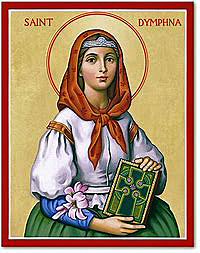
Imagine you are a fourteen-year-old girl and you discover that your father wants to hook up with you because you resemble your late mother. You’ve unfriended him on Facebook and you ignore his sext messages, but you still suspect he may have installed a toilet cam in your bathroom.
This was the cross sent by God to Saint Dymphna, who was born in Ireland during the seventh century. Until her fourteenth birthday the worst thing that had ever happened to Dymphna was the death of her mother the year before, but God had other plans for this daughter of a pagan Irish king and his devout Christian wife.
To test Dymphna’s faith God made her increasingly attractive to her father, Damon, the handsome king of Oriel. Thus, when Damon began thinking about taking another wife, he began to think about taking Dymphna, who resembled her late mother so much that Damon often found excuses to tuck Dymphna in at night and to tell her a bedtime story.
One night Damon told Dymphna “a true story” about a young, beautiful princess whose mother had died. The princess, although she was sad at first, lived happily ever after, “just her and her father and a magical dragon,” in a land called Honalee.
Perhaps it was the way Damon was sweating after he had finished telling the story, perhaps it was the way he tried to kiss Dymphna good-night on the lips, perhaps it was the dream she had later that night, the one in which Damon appeared as a dragon with a fire-breathing penis, but something told Dymphna it was time to get her own apartment.

She fled Ireland for the continent, accompanied by her faithful confessor (Father Gerbilanus) and two loyal servants. They landed in Belgium, eventually settling in the town of Gheel in a roomy apartment above a tavern. There Dymphna was home-schooled by her loyal servants. To fulfill the community-service requirement in her home-schooling program, Dymphna built a hospice for the poor and the sick of Gheel.
Meanwhile, her father, who still wanted a girl just like the girl he had married the first time around—and who still wanted her to provide him with a male heir—was able to locate Dymphna after the agents he had sent to look for her stopped in the tavern for supper and received in their change some of the coins Dymphna had spent on building the hospice. The coins bore an image of King Damon on one side and on the other side, an image of his late wife, who had an unsettling resemblance to Dymphna.
Damon traveled to Gheel to retrieve his daughter. He tortured and killed Father Gerbilanus when he would not allow the king to hide in the confessional and listen the next time Dymphna confessed her sins. Then Damon tried to force Dymphna to return with him to Ireland and become his bride, but she resisted, saying she had Greek verbs to conjugate. Furious, Damon drew his sword and cut off her head.
During the ensuing centuries, as more and more attractive young women who were being home-schooled had to ward off the advances of their fathers, St. Dymphna was promoted from patron saint of West Virginia to patron saint of home schooling. She is also an auxiliary patron saint of pub food, thanks her protection of St. Dymphna’s Pub on St. Mark’s Place in New York City.